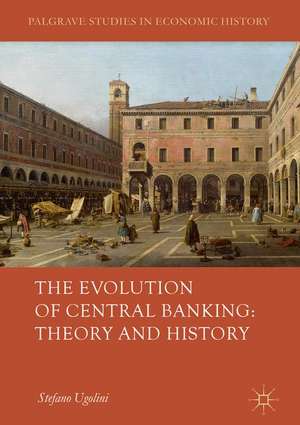The Evolution of Central Banking: Theory and History: Palgrave Studies in Economic History
Autor Stefano Ugolinien Limba Engleză Hardback – 4 dec 2017
Din seria Palgrave Studies in Economic History
-
 Preț: 497.34 lei
Preț: 497.34 lei -
 Preț: 358.22 lei
Preț: 358.22 lei - 15%
 Preț: 580.36 lei
Preț: 580.36 lei - 20%
 Preț: 939.29 lei
Preț: 939.29 lei -
 Preț: 292.28 lei
Preț: 292.28 lei - 17%
 Preț: 361.80 lei
Preț: 361.80 lei -
 Preț: 357.89 lei
Preț: 357.89 lei - 20%
 Preț: 690.48 lei
Preț: 690.48 lei - 17%
 Preț: 361.39 lei
Preț: 361.39 lei - 18%
 Preț: 945.79 lei
Preț: 945.79 lei - 18%
 Preț: 1012.53 lei
Preț: 1012.53 lei - 15%
 Preț: 700.29 lei
Preț: 700.29 lei - 18%
 Preț: 782.42 lei
Preț: 782.42 lei -
 Preț: 232.82 lei
Preț: 232.82 lei - 15%
 Preț: 644.82 lei
Preț: 644.82 lei -
 Preț: 384.31 lei
Preț: 384.31 lei - 15%
 Preț: 587.85 lei
Preț: 587.85 lei - 18%
 Preț: 899.21 lei
Preț: 899.21 lei - 18%
 Preț: 786.66 lei
Preț: 786.66 lei -
 Preț: 397.97 lei
Preț: 397.97 lei -
 Preț: 388.90 lei
Preț: 388.90 lei - 18%
 Preț: 737.57 lei
Preț: 737.57 lei -
 Preț: 387.20 lei
Preț: 387.20 lei - 15%
 Preț: 647.73 lei
Preț: 647.73 lei - 15%
 Preț: 646.62 lei
Preț: 646.62 lei -
 Preț: 419.06 lei
Preț: 419.06 lei - 15%
 Preț: 459.06 lei
Preț: 459.06 lei - 15%
 Preț: 712.22 lei
Preț: 712.22 lei - 18%
 Preț: 787.47 lei
Preț: 787.47 lei - 18%
 Preț: 1128.57 lei
Preț: 1128.57 lei - 15%
 Preț: 471.53 lei
Preț: 471.53 lei - 15%
 Preț: 640.88 lei
Preț: 640.88 lei - 18%
 Preț: 898.26 lei
Preț: 898.26 lei - 18%
 Preț: 1394.21 lei
Preț: 1394.21 lei -
 Preț: 422.90 lei
Preț: 422.90 lei - 18%
 Preț: 955.40 lei
Preț: 955.40 lei - 18%
 Preț: 730.47 lei
Preț: 730.47 lei - 15%
 Preț: 711.56 lei
Preț: 711.56 lei - 18%
 Preț: 783.98 lei
Preț: 783.98 lei - 18%
 Preț: 900.01 lei
Preț: 900.01 lei - 18%
 Preț: 896.08 lei
Preț: 896.08 lei - 15%
 Preț: 705.83 lei
Preț: 705.83 lei - 18%
 Preț: 787.15 lei
Preț: 787.15 lei - 15%
 Preț: 704.69 lei
Preț: 704.69 lei - 18%
 Preț: 1112.48 lei
Preț: 1112.48 lei
Preț: 949.55 lei
Preț vechi: 1157.98 lei
-18% Nou
Puncte Express: 1424
Preț estimativ în valută:
181.69€ • 189.72$ • 150.04£
181.69€ • 189.72$ • 150.04£
Carte tipărită la comandă
Livrare economică 15-29 aprilie
Preluare comenzi: 021 569.72.76
Specificații
ISBN-13: 9781137485243
ISBN-10: 1137485248
Pagini: 330
Ilustrații: XIII, 330 p.
Dimensiuni: 148 x 210 x 28 mm
Greutate: 0.56 kg
Ediția:1st ed. 2017
Editura: Palgrave Macmillan UK
Colecția Palgrave Macmillan
Seria Palgrave Studies in Economic History
Locul publicării:London, United Kingdom
ISBN-10: 1137485248
Pagini: 330
Ilustrații: XIII, 330 p.
Dimensiuni: 148 x 210 x 28 mm
Greutate: 0.56 kg
Ediția:1st ed. 2017
Editura: Palgrave Macmillan UK
Colecția Palgrave Macmillan
Seria Palgrave Studies in Economic History
Locul publicării:London, United Kingdom
Cuprins
1. Introduction.- 2. The Payments System.- 3. Lending of Last Resort and Supervision.- Issuing Money.- 5. Monetary Policy.- 6. Conclusions
Recenzii
“I would … recommend this book as a central reference to evolutionary economists (and evolutionary institutionalists, by extension) to make more thoughts on and build analytical models of central banking functions from an evolutionary point of view.” (Burak Erkut, Journal of Evolutionary Economics, July 4, 2020)
“The approach taken is a fresh one and will be useful, especially to scholars who are interested in specific areas where central banks have played an important role in economic development over time.” (Pierre Siklos, EH Net, eh.net, November, 2019)
“The Evolution of Central Banking is an outstanding volume representing both a high-quality research study in history of economics and an incredibly useful, clear and informative book of monetary political economy that can be illuminating for any person interested in how money and its institutions actually work. … The text is well written and widely accessible to both researchers and students.” (Stefano Solari, History of Economic Thought and Policy, Issue 2, 2018)
Notă biografică
Stefano Ugolini is Assistant Professor of Economics at the University of Toulouse.
Textul de pe ultima copertă
This book is the first complete survey of the evolution of monetary institutions and practices in Western countries from the Middle Ages to today. It radically rethinks previous attempts at a history of monetary institutions by avoiding institutional approach and shifting the focus away from the Anglo-American experience. Previous histories have been hamstrung by the linear, teleological assessment of the evolution of central banks. Free from such assumptions, Ugolini’s work offers bankers and policymakers valuable and profound insights into their institutions
Using a functional approach, Ugolini charts an historical trajectory longer and broader than any other attempted on the subject. Moving away from the Anglo-American perspective, the book allows for a richer (and less biased) analysis of long-term trends. The book is ideal for researchers looking to better understand the evolution of the institutions that underlie the global economy.
Caracteristici
New approach moves beyond Anglo-American bias Avoids focus on institutions Takes a broader view of the evolution of central banks to avoid teleological assessment
